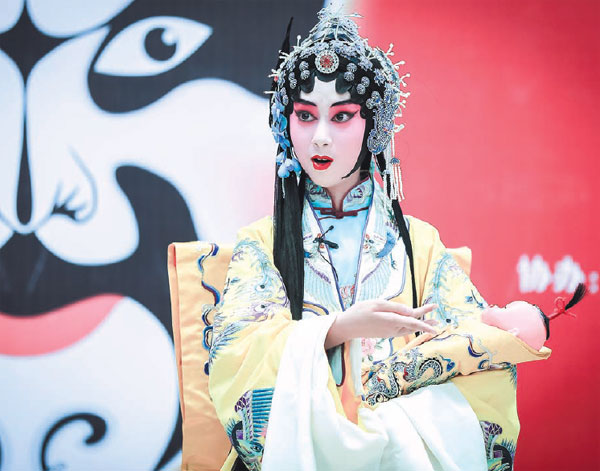Peking opera on world stage
Updated: 2015-06-02 07:11
By Wang Kaihao(China Daily USA)
|
||||||||
Sun Ping has spent her career mixing Peking Opera with Western classics in a bid to bring the Chinese art form to audiences across the globe. Wang Kaihao reports.
As dozens of foreign students took their final curtain calls in front of an excited audience at Beijing Foreign Studies University, Sun Ping, a Peking Opera veteran in her early 50s, was overcome with excitement.
"Even the biggest stars of Peking Opera don't get cheered for every line they sing," she says. "However, these students almost do. It's the power of cultural resonance."
|
A student performs at China's first national Peking Opera competition for overseas college students in Beijing. Photos Provided to China Daily |
The performance was China's first national Peking Opera competition for overseas college students. Before the competition, the participants had no previous experience.
"They can speak some Chinese, but that's all," says Sun, who is the executive director of the Chinese Operas Studies Center at Renmin University of China.
She is amazed that the students are able to present a wonderful show after only 14 days' of intense training. "After the initial excitement and curiosity, you can't imagine how hardworking they have to be to practice something they barely know."
She believes foreign students can be ambassadors for Chinese culture. Her proposal to add selective Peking Opera courses into the syllabus for overseas students has recently been approved by several major universities in Beijing.
The competition, Sun says, is expected to become an annual event and grow in size.
"Peking Opera is an ideal summary of traditional Chinese aesthetics, values and ethics, and is able to erase misunderstandings and explain Chinese society to the world. It will thus become an efficient channel of diplomacy," says Sun, who is also a member of the Chinese People's Political Consultative Conference.
Sun traveled to Hungary in 1990 as part of a short-term cultural communication program organized by the Ministry of Culture. The trip was the beginning of her decades-long effort to mix Peking Opera with mainstream drama in the Western world.
Her first adapted work was King St. Laszlo. She added elements of Peking Opera, such as acting techniques, simple stage layouts and face-mask painting into the classic Hungarian opera. The show was performed more than 300 times around Europe.
The success of the show saw Sun invited back to Hungary, and she stayed in the country for nine years. Her work in Hungary saw her adapt the Chinese literary classic Journey to the West for the stage, mixing characteristics of Peking Opera and Western musicals. The show was performed 600 times in Europe.
She has added elements of Peking Opera into a wide range of Western theater classics, from Hamlet to West Side Story.
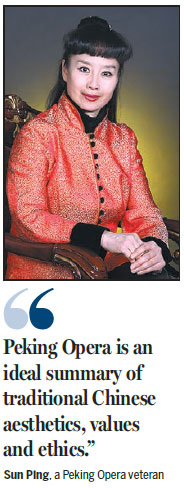
"No matter how many times Western audiences have seen these plays, it still feels refreshing to see something different. Sometimes, we don't directly move Peking Opera into the shows, but the highly abstract stage design and motion will evoke the spirit of traditional Chinese drama."
"Action drama", a new genre of stage performance launched by Sun was therefore formed. An Action Drama Festival that began in 1994, continues to be held annually in Europe.
"Our shows are recognized overseas because what I present is a different tradition," Sun says. "I would never get such enthusiastic feedback if I was an opera actress, or a filmmaker, because those art forms were born in the West and established there."
After 2000, she tried combining Peking Opera with various art genres in the United States. The most notable is probably her mix of Peking Opera's vocalization and symphony.
Sun plans to bring more than 100 Peking Opera shows to Lincoln Center in New York in the near future. Though details of the negotiation have not been revealed, she confidently predicts it will likely be the biggest Peking Opera event in the US since Mei Lanfang's tour in the 1930s.
"If Peking Opera is only performed overseas accompanied by short-term cultural communication programs, its influence will be very limited. If we really want to create a success, we need at least three months' consecutive performances."
She says despite stage success overseas, Peking Opera lacks a proper presence in the academic world.
This is why Sun established the Chinese Operas Studies Center in 2007. An ongoing publishing project of 100 Peking Opera Classics also released her team's ambition to have the world's first English encyclopedia on Peking Opera. The first two volumes have been published since 2012.
Sun is also in charge of a program, kicking off in 2014, that will study some 30,000 Peking Opera scripts, costumes and relevant cultural relics stored in Beijing's Palace Museum. A bilingual (Chinese and English) book introducing those collections will be released in 2016, and other publishing projects will follow in the next few years.
"If their cultural contexts remain unexplained, they are only cultural relics, but the research will turn them into living treasures.
"Peking Opera is not a sub-genre of Western opera, its original Chinese name of jingju should be kept in the English-speaking world, just like Japan's kabuki," Sun says. "Maybe, it will happen after our ongoing works are finished."
Contact the writer at wangkaihao@chinadaily.com.cn
(China Daily USA 06/02/2015 page7)
- Bridging rural-urban gap in education from start
- Overseas study consultancy offers scholarships to top 5 US universities
- China trying to reach 13 people near MERS patient
- Gaokao countdown begins with incense and prayers
- Children's Day celebrated across China
- Ballet dancers perform at Zhalong National Nature Reserve in China's Qiqihar
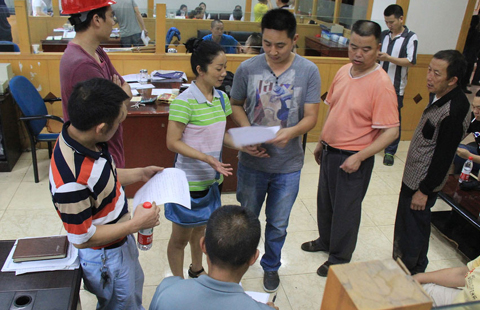
 Anxious wait for family members of passengers on capsized ship
Anxious wait for family members of passengers on capsized ship
 Key facts in the 12 hours after ship capsizes in Yangtze River
Key facts in the 12 hours after ship capsizes in Yangtze River
 Massive operation launched to rescue ship passengers
Massive operation launched to rescue ship passengers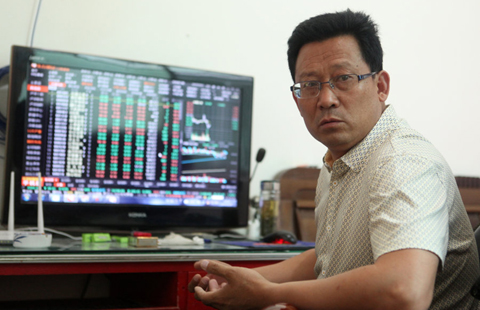
 Farmers bet on the bull market
Farmers bet on the bull market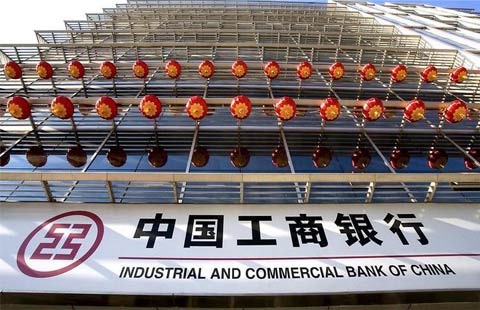
 Top 10 largest banks in the world
Top 10 largest banks in the world
 Ten injured in crane accident in Manhattan
Ten injured in crane accident in Manhattan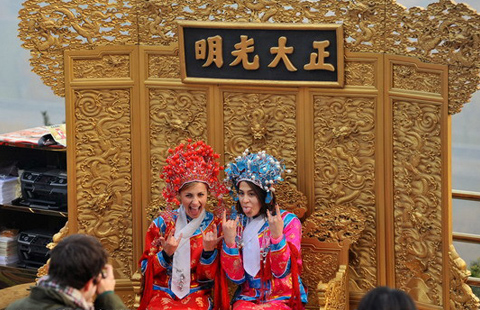
 Forum trends: Becoming 'a little more Chinese'
Forum trends: Becoming 'a little more Chinese'
 Giraffe survives for five years with zig-zag neck
Giraffe survives for five years with zig-zag neck
Most Viewed
Editor's Picks

|

|

|

|

|

|
Today's Top News
Ship carrying 458 people sinks in Yangtze River
Win-win solution is US should seek in Aisa
Woman behind Silicon Valley sex bias suit appealing verdict
Defense hawk Senator Lindsey Graham launches presidential bid
Chinese soldier
gets UN award
Nation's astronauts eager for foreign missions
China committed to upholding peace, stability in South China Sea
Li's trip a watershed in China-Latin America ties
US Weekly

|

|
